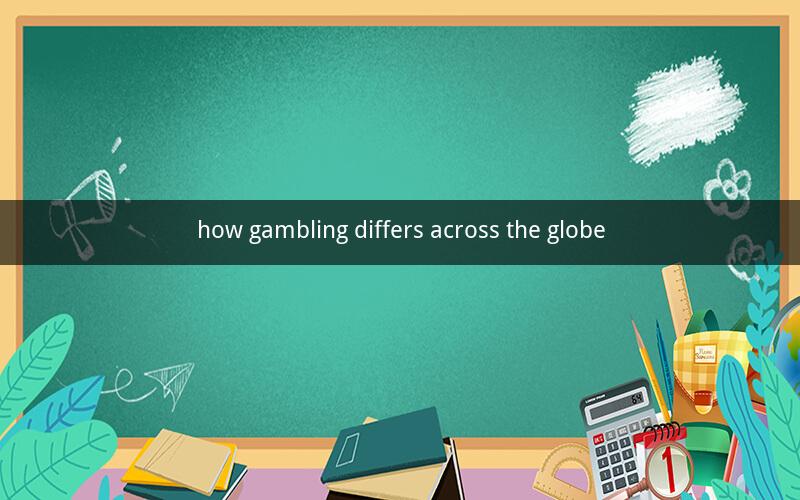
How Gambling Differs Across the Globe
Table of Contents
1. Introduction
2. Legalization of Gambling
3. Types of Gambling
4. Cultural Influences on Gambling
5. Economic Impact of Gambling
6. Social Impact of Gambling
7. Conclusion
1. Introduction
Gambling, an ancient activity that has spanned across civilizations, is a form of entertainment that varies greatly in its practices and regulations. From Las Vegas to Macau, from the United Kingdom to Japan, the world of gambling presents a diverse tapestry of customs, legal frameworks, and cultural significances. This article explores how gambling differs across the globe, highlighting the unique aspects of this phenomenon in various regions.
2. Legalization of Gambling
The first notable difference in gambling across the globe is its legal status. While some countries have embraced gambling with open arms, others have strictly regulated or even banned it. For instance, the United States has a patchwork of state laws, with some states allowing full-fledged casinos and others prohibiting any form of gambling. In contrast, countries like the United Kingdom and Ireland have a more lenient approach, with regulated gambling industries.
3. Types of Gambling
Gambling comes in various forms, each with its own set of rules and appeal. In the United States, slots and poker are popular, with Las Vegas serving as the gambling capital. Europe, on the other hand, has a strong tradition of horse racing and betting. In Asia, Macau is known for its luxurious casinos, while Japan has a rich history of pachinko, a type of mechanical pinball game that is often referred to as "Japanese slot machines."
4. Cultural Influences on Gambling
Cultural factors play a significant role in shaping the gambling landscape across the globe. In some countries, gambling is deeply rooted in tradition and history. For example, in the Philippines, cockfighting is a centuries-old practice, while in India, rummy is a popular card game with a large following. Conversely, in some Western countries, gambling is seen as a way to escape the stresses of daily life or as a source of entertainment.
5. Economic Impact of Gambling
The economic impact of gambling is a double-edged sword. On one hand, it generates significant revenue for governments and creates jobs. In Macau, the gambling industry contributes a substantial portion of the country's GDP. On the other hand, it can lead to economic problems, such as increased debt and decreased productivity. The economic impact of gambling varies greatly depending on the country and the specific industry.
6. Social Impact of Gambling
Gambling has a profound social impact, with both positive and negative consequences. On the positive side, it can provide a sense of community and camaraderie, as well as entertainment for individuals. However, on the negative side, it can lead to addiction, family breakdown, and social isolation. The social impact of gambling is a complex issue that varies greatly across different regions.
7. Conclusion
In conclusion, gambling is a multifaceted activity that differs greatly across the globe. From its legal status to its cultural significance, the world of gambling is a diverse and dynamic field. While some regions have embraced gambling, others have taken a more cautious approach. Understanding the various aspects of gambling across the globe can help us appreciate the rich tapestry of this global phenomenon.
Questions and Answers
1. Q: How does the legal status of gambling in the United States differ from that in the United Kingdom?
A: In the United States, gambling is a state-by-state issue, with some states allowing full-fledged casinos and others prohibiting any form of gambling. In contrast, the United Kingdom has a more lenient approach, with regulated gambling industries.
2. Q: What is the most popular form of gambling in Europe?
A: Horse racing and betting are popular forms of gambling in Europe, particularly in countries like France, the United Kingdom, and Ireland.
3. Q: How does gambling differ in Japan from other Asian countries?
A: Japan has a unique gambling landscape, with pachinko being a popular form of entertainment. While other Asian countries, such as Macau and Singapore, have embraced casinos, Japan has not yet legalized large-scale casinos.
4. Q: What is the economic impact of gambling in Macau?
A: The gambling industry in Macau contributes a substantial portion of the country's GDP, making it a significant economic driver.
5. Q: How does gambling affect the social fabric of a community?
A: Gambling can have both positive and negative social impacts, such as fostering a sense of community and camaraderie or leading to addiction and social isolation.
6. Q: Is gambling addiction a global issue?
A: Yes, gambling addiction is a global issue that affects individuals in various regions. The extent of the problem varies depending on the country and the specific gambling industry.
7. Q: What are some cultural influences on gambling in the Philippines?
A: Cockfighting is a centuries-old practice in the Philippines, with a strong cultural significance.
8. Q: How does gambling differ in India from other countries in Asia?
A: In India, rummy is a popular card game with a large following, while other countries in Asia have a more diverse range of gambling activities.
9. Q: What is the role of technology in the gambling industry?
A: Technology has revolutionized the gambling industry, with online gambling and mobile apps becoming increasingly popular.
10. Q: How can governments regulate gambling effectively?
A: Governments can regulate gambling effectively by implementing strict laws and regulations, promoting responsible gambling, and providing support for individuals with gambling addiction.